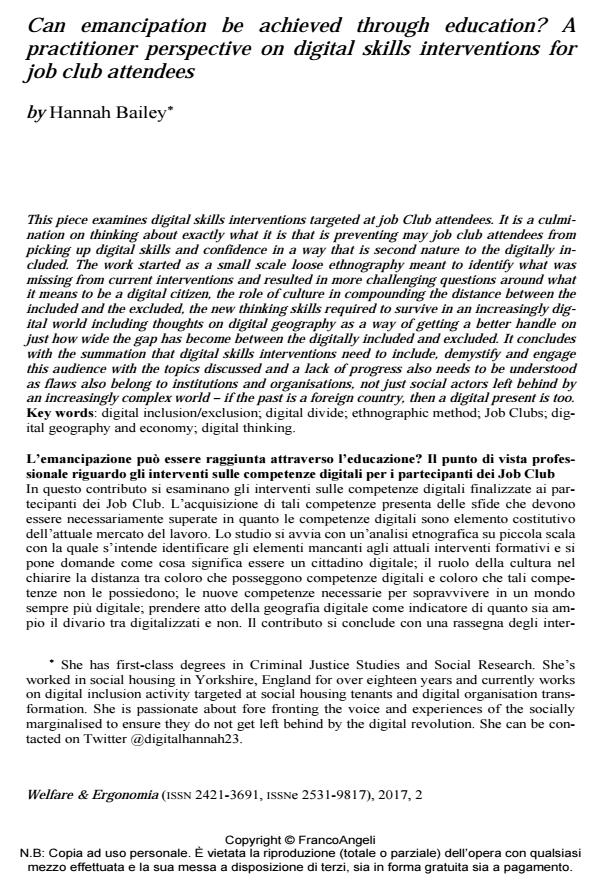Can emancipation be achieved through education? A practitioner perspective on digital skills interventions for job club attendees
Titolo Rivista WELFARE E ERGONOMIA
Autori/Curatori Hannah Bailey
Anno di pubblicazione 2019 Fascicolo 2017/2 Lingua Inglese
Numero pagine 11 P. 51-61 Dimensione file 184 KB
DOI 10.3280/WE2017-002003
Il DOI è il codice a barre della proprietà intellettuale: per saperne di più
clicca qui
Qui sotto puoi vedere in anteprima la prima pagina di questo articolo.
Se questo articolo ti interessa, lo puoi acquistare (e scaricare in formato pdf) seguendo le facili indicazioni per acquistare il download credit. Acquista Download Credits per scaricare questo Articolo in formato PDF

FrancoAngeli è membro della Publishers International Linking Association, Inc (PILA)associazione indipendente e non profit per facilitare (attraverso i servizi tecnologici implementati da CrossRef.org) l’accesso degli studiosi ai contenuti digitali nelle pubblicazioni professionali e scientifiche
This piece examines digital skills interventions targeted at job Club attendees. It is a culmi-nation on thinking about exactly what it is that is preventing may job club attendees from picking up digital skills and confidence in a way that is second nature to the digitally included. The work started as a small scale loose ethnography meant to identify what was missing from current interventions and resulted in more challenging questions around what it means to be a digital citizen, the role of culture in compounding the distance between the included and the excluded, the new thinking skills required to survive in an increasingly digital world including thoughts on digital geography as a way of getting a better handle on just how wide the gap has become between the digitally included and excluded. It concludes with the summation that digital skills interventions need to include, demystify and engage this audience with the topics discussed and a lack of progress also needs to be understood as flaws also belong to institutions and organisations, not just social actors left behind by an increasingly complex world – if the past is a foreign country, then a digital present is too.
In questo contributo si esaminano gli interventi sulle competenze digitali finalizzate ai par-tecipanti dei Job Club. L’acquisizione di tali competenze presenta delle sfide che devono essere necessariamente superate in quanto le competenze digitali sono elemento costitutivo dell’attuale mercato del lavoro. Lo studio si avvia con un’analisi etnografica su piccola scala con la quale s’intende identificare gli elementi mancanti agli attuali interventi formativi e si pone domande come cosa significa essere un cittadino digitale; il ruolo della cultura nel chiarire la distanza tra coloro che posseggono competenze digitali e coloro che tali competenze non le possiedono; le nuove competenze necessarie per sopravvivere in un mondo sempre più digitale; prendere atto della geografia digitale come indicatore di quanto sia ampio il divario tra digitalizzati e non. Il contributo si conclude con una rassegna degli interventi sulle competenze digitali la cui mission è includere, demistificare e coinvolgere un numero sempre più ampio di cittadini. Se non vi è progresso ciò sembra essere dovuto, tra l’altro, oltre agli argomenti già enunciati, dalle criticità di mettere in moto il processo d’inclusione da parte delle istituzioni e delle organizzazioni, tant’è che gli attori sociali non sono aiutati ad acquisire le competenze per rispondere all’attuale complessità relazionale e comunicativa: se il passato è un paese straniero, lo è anche un presente digitale.
Keywords:Inclusione/esclusione digitale; digital divide; metodo etnografico; Job Clubs; geografia e economia digitale; pensiero digitale.
- The Tech Partnership (2015). 2017 map showing the overall likelihood of digital exclusion. -- Available: http://heatmap.thetechpartnership.com/?area=Barnsley&metric=total. Last accessed 6 January 2017.
- Alain Thomas Consultancy and the Communities First Support Network (2017). Introduction to co-production and participatory research. -- Available: http://blogs.cardiff.ac.uk/schep/wp-content/uploads/sites/413/2017/06/Introduction-to-Co-Production-and-Participatory-Research.pdf. Last accessed 18 January 2018.
- EntitledTo.co.uk (2017). Alternative Payment Arrangements under Universal Credit. -- Available: https://www.entitledto.co.uk/help/Universal-Credit-Alternative-Payment-Arrangements. Last accessed 21 January 2018.
- Evans D. (2016). Social Class, Place and the Limits of Habitus. -- Available: http://socialtheoryapplied.com/2016/04/11/social-class-place-limits-habitus/. Last accessed 16 January 2018.
- Fitzpatrick A. (2012). Internet Access Is a Human Right, Says United Nations. -- Available: http://mashable.com/2012/07/06/internet-human-right/#T8b23W6VYOqw. Last accessed 21 January 2018.
- France24 (2017). Social media ‘bots’ from Russia distorting global politics: study. -- Available: https://24plusnews.com/social-media-bots-from-russia-distorting-global-politics-study/. Last accessed 22 January 2018.
- Gibson W. (2012). Future Has Arrived. -- Available: https://quoteinvestigator.com/2012/01/24/future-has-arrived/. Last accessed 7 February 2017.
- Google (2017). Learn analytics with free online courses. -- Available: https://analytics.google.com/analytics/academy/. Last accessed 15 January 2018.
- Gov.uk (2010). Welfare Reform White Paper: Universal Credit to make work pay: Radical welfare reforms bring an end to complex system. -- Available: https://www.gov.uk/government/news/welfare-reform-white-paper-universal-credit-to-make-work-pay-radical-welfare-reforms-bring-an-end-to-complex-system. Last accessed 16 January 2018.
- Gov.uk (2015). English Indices of Deprivation 2015. -- Available: https://www.gov.uk/government/statistics/english-indices-of-deprivation-2015. Last accessed 21 January 2017.
- Gov.uk (2016). Apply Universal Credit. -- Available: https://www.gov.uk/apply-universal-credit. Last accessed 22 January 2018.
- The Guardian (2017). Labour won social media election, digital strategists say. -- Available: https://www.theguardian.com/politics/2017/jun/09/digital-strategists-give-victory-to-labour-in-social-media-election-facebook-twitter. Last accessed 22 January 2018.
- Hunt K. (2017). China tells Donald Trump to lay off Twitter. -- Available: http://edition.cnn.com/2017/01/04/politics/china-trump-twitter/index.html. Last accessed 22 January 2018.
- Kahneman D. (2011). Thinking, Fast and Slow. UK: penguin
- McClean P. (2017). EU regulators clamp down on social media searches on job applicants. -- Available: https://www.ft.com/content/370062c6-6709-11e7-8526-7b38dcaef614. Last accessed 16 January 2018.
- Melloulchi F. (2017). Fabrique numérique de Gonesse - URBACT. -- Available: https://www.youtube.com/watch?v=59FPz4aHUXs&feature=youtu.be. Last accessed 22 January 2018.
- Seddon J. (2008). Systems Thinking in the Public Sector the failure of the reform regime... and a manifesto for another way. London: Triarchy Press, pp. 66-81.
- Seddon J. (2013). Dissolving a Dangerous Enthusiasm: Taking a Systems Approach to IT Systems. he Journal of Information Technology Management. 26(4): 11-17.
- Stuff They Don’t Want You to know (2016). Technology and the Occult. -- Available: https://www.stufftheydontwantyoutoknow.com/podcasts/technology-and-the-occult.htm. Last accessed 11 January 2018.
Hannah Bailey, Can emancipation be achieved through education? A practitioner perspective on digital skills interventions for job club attendees in "WELFARE E ERGONOMIA" 2/2017, pp 51-61, DOI: 10.3280/WE2017-002003